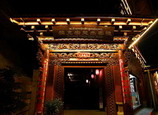
Song said the national private museum association could help its members attract sponsors and visitors by sharing resources and experience.
The Sandu Museum in Chengdu, capital of southwest China's Sichuan Province, has always been free to visitors. The construction of the museum cost nearly 40 million yuan (about 6.4 million U.S. dollars). The annual fees for its employees' salaries, as well as its daily maintenance, amount to about 6 million yuan.
"Last year, the government gave me a subsidy of 600,000 yuan. But the sum was far from enough," said Gao Xinghua, owner of the museum.
Gao is also chairman of a large real estate development company.
"I have a company to make up for the losses of my museum. But many other private museums do not have financial support from companies and face great financial difficulties," said Gao.
Gao said the government should provide more policy support and funding to help the museums survive.
Li Tao, curator of a clock and watch museum in northeast China's Liaoning Province, relies on rental fees from the property he owns to support the museum, which is also free for the public.
Li said he hopes the new association can help private museums to find more sound operational methods.
"Having a national private museum association could help preserve and protect cultural heritage, which is not only the responsibility of the government and individuals, but also that of society," Song said.
He said he hopes the association will strengthen exchanges between private museums and help them get more attention from the government and society.



















![]()
